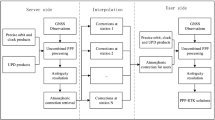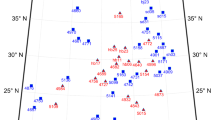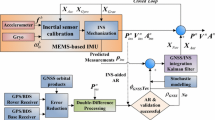Abstract
Despite the benefits of integer ambiguity resolution (IAR) in precise point positioning (PPP), observation outages and harsh signal environments still impact float ambiguity estimation in kinematic surveying, consequently resulting in ambiguity-fixed failure. The inertial navigation system (INS) is an autonomous and spontaneous positioning one, which could provide continuous and superior positioning accuracy over short time. Thus, the INS attains more accurate position than code solution. Moreover, the tight integration of INS and PPP is capable of continuous operation where there are less than four satellites available. These advantages can improve float ambiguity estimation and assist in re-initializing the interrupted ambiguity and PPP solution. Based on the good quality of float ambiguity, the ambiguity dilution precision (ADOP) and the size of integer ambiguity search space are reduced, and then, the IAR-PPP is improved. In this work, the INS aiding effect on IAR-PPP was revealed by the sufficient theoretical analysis and performance assessment. A ring laser gyroscope-based navigation-grade IMU and a fiber optic gyroscope-based tactical-grade IMU were utilized to conduct experiments in an open-sky environment and urban area. The assessment adopted the following aspects of ADOP, bootstrapping success rate, time to fix and position errors. It is found that IAR-PPP with INS aiding achieves an enhanced performance during GPS outage when INS could deliver a superior accurate position. For the navigation- and tactical-grade IMU, the INS-aided ambiguity re-fixing performance can be classified as three levels: significant improvement for the outage duration less than 10 s, moderate improvement for the outage duration from 10 to 60 s and a little or zero improvement for the outage duration longer than 60 s. From the viewpoint of the INS-predicted position domain, an accuracy better than 0.1 m and 1.0 m is required for the significant and moderate improvement, while one can only achieve a little or zero improvement if the position error is larger than 1.0 m. Besides, we also performed the INS-aided IAR-PPP in real urban environment. For the urban environments, the span of clean data is often shorter than 30 min due to intermittent signal interruptions; thus, ambiguity re-fixing for PPP always fails. INS-aided information could bridge the data gaps and achieve fast ambiguity re-fixing. In summary, INS aiding information is capable of improving IAR-PPP performance significantly over a short GPS outage.
















Similar content being viewed by others
References
Crassidis JL, Junkins JL (2011) Optimal estimation of dynamics systems. CRC Press, Boca Raton, pp 145–146
Gao Z, Zhang H, Ge M, Niu X, Shen W, Wickert J, Schuh H (2015) Tightly coupled integration of ionosphere-constrained precise point positioning and inertial navigation systems. Sensors 15(3):5783–5802
Geng J, Bock Y (2013) Triple-frequency GPS precise point positioning with rapid ambiguity resolution. J Geod 87(5):449–460
Geng J, Shi C (2017) Rapid initialization of real-time PPP by resolving undifferenced GPS and GLONASS ambiguities simultaneously. J Geod 91(4):361–374
Geng J, Meng X, Dodson A, Ge M, Teferle F (2010) Rapid re-convergences to ambiguity-fixed solutions in precise point positioning. J Geod 84(12):705–714
Geng J, Teferle FN, Meng X, Dodson AH (2011) Towards PPP-RTK: ambiguity resolution in real-time precise point positioning. Adv Space Res 47(10):1664–1673
Grejner-Brzezinska D, Da R, Toth C (1998) GPS error modeling and OTF ambiguity resolution for high-accuracy GPS/INS integrated system. J Geod 72(11):626–638
Gu S, Lou Y, Shi C, Liu J (2015) BeiDou phase bias estimation and its application in precise point positioning with triple-frequency observable. J Geod 89(10):979–992
Han H, Wang J, Wang J, Moraleda AH (2017) Reliable partial ambiguity resolution for single-frequency GPS/BDS and INS integration. GPS Solut 21(1):251–264
Kouba J, Heroux P (2001) Precise point positioning using IGS orbit and clock products. GPS Solut 5(2):12–28
Laurichesse D, Blot A (2016) Fast PPP convergence using multi-constellation and triple-frequency ambiguity resolution In: Proceedings of the ION GNSS 2016, Institute of Navigation, Portland, OR, USA, 12–16 September 2016, pp 2082–2088
Lee HK, Wang J, Rizos C (2005) An integer ambiguity resolution procedure for GPS/Pseudolite/INS integration. J Geod 79:242–255
Li X, Zhang X, Ge M (2011) Regional reference network augmented precise point positioning for instantaneous ambiguity resolution. J Geod 85(3):151–158
Li T, Wang J, Laurichesse D (2014a) Modeling and quality control for reliable precise point positioning integer ambiguity resolution with GNSS modernization. GPS Solut 18(3):429–442
Li X, Zhang X, Guo F (2014b) Predicting atmospheric delays for rapid ambiguity resolution in precise point positioning. Adv Space Res 54(5):840–850
Li X, Ge M, Dai X, Ren X, Fritsche M, Wickert J, Schuh H (2015) Accuracy and reliability of multi-GNSS real-time precise positioning: GPS, GLONASS, BeiDou, and Galileo. J Geod 89(6):607–635
Li P, Zhang X, Ren X, Zuo X, Pan Y (2016) Generating GPS satellite fractional cycle bias for ambiguity-fixed precise point positioning. GPS Solut 20(4):1–12
Li P, Zhang X, Guo F (2017a) Ambiguity resolved precise point positioning with GPS and BeiDou. J Geod 91(1):25–40
Li T, Zhang H, Niu X, Gao Z (2017b) Tightly-coupled integration of multi-GNSS single-frequency RTK and MEMS-IMU for enhanced positioning performance. Sensors 17(11):2462–2483
Li X, Li X, Yuan Y, Zhang K, Zhang X, Wickert J (2017c) Multi-GNSS phase delay estimation and PPP ambiguity resolution: GPS, BDS, GLONASS, Galileo. J Geod. https://doi.org/10.1007/s00190-017-1081-3
Liu S, Sun F, Zhang L, Li W, Zhu X (2016) Tight integration of ambiguity-fixed PPP and INS: model description and initial results. GPS Solut 20(1):39–49
Liu Y, Lou Y, Ye S, Zhang R, Song W, Zhang X et al (2017) Assessment of PPP integer ambiguity resolution using GPS, GLONASS and BeiDou (IGSO, MEO) constellations. GPS Solut 21(4):1647–1659
Puente I, González-Jorge H, Martínez-Sánchez J, Arias P (2013) Review of mobile mapping and surveying technologies. Measurement 46(7):2127–2145
Scherzinger BM (2000) Precise robust positioning with inertial/GPS RTK. In: Proceedings of the ION GPS, Salt Lake City, UT, USA, 19–22 September 2000, pp 155–162
Scherzinger BM (2002) Robust positioning with single frequency inertially aided RTK. In: Proceedings of the ION NTM, San Diego, CA, USA, 28–30 January 2002, pp 911–917
Takasu T, Yasuda A (2010) Kalman-filter-based integer ambiguity resolution strategy for long-baseline RTK with ionosphere and troposphere estimation. In: Proceedings of the ION GNSS, Portland, OR, USA, 21–24 September 2010, pp 161–171
Teunissen PJG (1995) The least-squares ambiguity decorrelation adjustment: a method for fast GPS integer ambiguity estimation. J Geod 70:65–82
Teunissen PJG, Khodabandeh A (2015) Review and principles of PPP-RTK methods. J Geod 89(3):217–240
Teunissen PJG, de Jonge PJ, Tiberius CCJM (1996) The volume of the GPS ambiguity search space and its relevance for integer ambiguity resolution. In: Proceedings of the ION GPS-96, pp 889–898
Teunissen PJG, Odolinski R, Odijk D (2014) Instantaneous BeiDou + GPS RTK positioning with high cut-off elevation angles. J Geod 88(4):335–350
Titterton DH, Weston JL (2004) Strapdown inertial navigation technology, 2nd edn. American Institute of Aeronautics and Astronautics, Reston, pp 354–356
Ye S, Liu Y, Song W, Lou Y, Yi W, Zhang R, Jiang P, Xiang Y (2016) A cycle slip fixing method with GPS + GLONASS observations in real-time kinematic PPP. GPS Solut 20(1):101–110
Yi W, Song W, Lou Y, Shi C, Yao Y, Guo H, Chen M, Wu J (2017) Improved method to estimate undifferenced satellite fractional cycle biases using network observations to support PPP ambiguity resolution. GPS Solut 21(3):1369–1378
Zhang X, Li X (2012) Instantaneous re-initialization in real-time kinematic PPP with cycle slip fixing. GPS Solut 16(3):315–327
Zhang X, Li P (2016) Benefits of the third frequency signal on cycle slip correction. GPS Solut 20(3):451–460
Zhang X, Zhu F, Tao X, Duan R (2017) New optimal smoothing scheme for improving relative and absolute accuracy of tightly coupled GNSS/SINS integration. GPS Solut 21(3):861–872
Acknowledgements
This study is supported by the National Science Fund for Distinguished Young Scholars (Grant No. 41825009) and the Funds for Creative Research Groups of China (Grant No. 41721003).
Author information
Authors and Affiliations
Corresponding author
Rights and permissions
About this article
Cite this article
Zhang, X., Zhu, F., Zhang, Y. et al. The improvement in integer ambiguity resolution with INS aiding for kinematic precise point positioning. J Geod 93, 993–1010 (2019). https://doi.org/10.1007/s00190-018-1222-3
Received:
Accepted:
Published:
Issue Date:
DOI: https://doi.org/10.1007/s00190-018-1222-3




